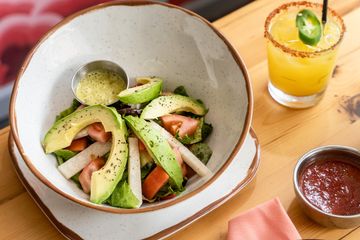Celebrate fun with happy hour and bold Mexican cocktails
Is Mexican Food Healthy? Unpacking the Nutritional Conveniences of Standard Active Ingredients
The inquiry of whether Mexican food is healthy welcomes an exploration of its traditional components. Beans and corn act as fundamental staples, abundant in protein and fiber. Avocados supply beneficial fats, while various natural herbs and flavors include flavor and wellness benefits - hand crafted margarita. Together, these elements create a tapestry of nourishment. The healthiness of Mexican food commonly depends on preparation techniques and part sizes. What function do these variables play in determining its general dietary worth?
The Power of Beans: Protein and Fiber-Rich Staples
Although frequently ignored, beans serve as a cornerstone of Mexican cuisine, using a riches of dietary advantages. Rich in protein, they are an outstanding plant-based choice for those looking for to satisfy their nutritional healthy protein needs. This high protein material supports muscle mass fixing and development, making beans important for both meat-eaters and vegetarians alike. Furthermore, beans are an exceptional source of dietary fiber, which aids in digestion and promotes a feeling of volume, potentially helping with weight administration.
The range of beans utilized in Mexican recipes, such as black beans, pinto beans, and kidney beans, contributes to a varied flavor profile and can boost dishes nutritionally. Furthermore, beans are low in fat and include vital minerals and vitamins, including iron, magnesium, and folate. With each other, these features make beans an important ingredient, delivering both nutrition and sustenance in typical Mexican fare.

Corn: a Versatile Grain With Nutritional Perks
Corn attracts attention as a functional grain fundamental to Mexican food, celebrated not only for its cooking applications yet additionally for its impressive nutritional profile. As a main active ingredient in dishes like tortillas, tamales, and pozole, corn provides crucial nutrients that add to a well balanced diet plan. Rich in carbohydrates, it functions as a substantial energy source, while additionally being low in fat, making it a beneficial alternative for various dietary needs.
Moreover, corn is a good source of nutritional fiber, which helps in digestion and promotes satiation. It contains considerable quantities of vitamins such as B-complex vitamins, which are important for basal metabolism. The presence of anti-oxidants, specifically carotenoids, adds to general wellness by reducing oxidative anxiety. Furthermore, corn is gluten-free, catering to those with gluten level of sensitivities. Generally, the nutritional benefits of corn underscore its relevance in conventional Mexican food and its role in a healthy and balanced diet regimen.
Avocados: Healthy Fats and Nutrients in Every Bite
Avocados play a substantial role in Mexican cuisine, matching meals with their luscious texture and rich taste. Beyond their cooking allure, avocados are commemorated for their impressive dietary profile. They are a rich source of healthy and balanced monounsaturated fats, which can aid lower bad cholesterol levels and support heart wellness. In addition, avocados are loaded with essential vitamins and minerals, consisting of potassium, vitamin E, and B vitamins, contributing to total wellness.
The high fiber content in avocados aids digestion and promotes satiety, making them an advantageous enhancement to any type of meal. Their distinct nutrient structure can also sustain skin health and offer anti-inflammatory benefits. Including avocados into conventional Mexican recipes or appreciating them as a standalone treat can improve both flavor and nourishment, demonstrating why they are a precious staple in Mexican cuisine. In general, avocados supply a scrumptious means to delight in healthy fats and critical nutrients in every bite.

Natural Herbs and spices: Flavorful Health And Wellness Boosters
While delighting in the rich flavors of Mexican cuisine, one can not ignore the important role that spices and herbs play in boosting both preference and health. Components such as oregano, chili, and cilantro peppers not only add to the lively taste account yet also provide considerable wellness advantages. Cilantro is understood for its cleansing residential properties, helping to eliminate hefty metals from the body, while oregano is packed with anti-oxidants and has anti-inflammatory results.
Chili peppers, a staple in numerous Mexican meals, consist of capsaicin, which has been linked to improved metabolism and discomfort alleviation. In addition, spices like cumin and coriander support food digestion and might help her latest blog in blood glucose policy. Incorporating these flavorful wellness boosters right into dishes not just improves the culinary experience yet additionally advertises general well-being, making Mexican food not simply tasty, but likewise nutritionally helpful.
Standard Cooking Approaches: Enhancing Nourishment and Flavor
Traditional food preparation approaches in Mexican food play a vital duty in improving both nutrition and taste, as they commonly focus on classic techniques and fresh ingredients. Strategies such as nixtamalization, where corn is saturated and prepared in an alkaline remedy, not just improve the nutrient account of tortillas however additionally improve their digestibility - mexican food. In addition, using slow-moving cooking approaches, like stewing or braising, enables flavors to combine beautifully while maintaining the integrity of the active ingredients

Regularly Asked Concerns
Are Mexican Food Portions Generally Larger Than Other Cuisines?
Mexican food parts are typically larger than those of lots of various other cuisines. This characteristic reflects traditional dining techniques, emphasizing public sharing and hearty meals, which can lead to a more substantial serving size overall.
How Does the Preparation Approach Affect Healthiness of Mexican Food?
Prep work techniques greatly affect the healthiness of Mexican food. Techniques such as cooking or steaming maintain nutrients, while frying can raise harmful fat content. Choices of components and cooking designs inevitably establish overall nutritional worth.
Can Mexican Food Be Tailored for Particular Dietary Restrictions?
Mexican food can without a doubt be tailored for certain dietary restrictions. Replacements, such as using corn tortillas for gluten-free diets or incorporating more veggies, enable individuals to appreciate conventional tastes while fitting various nutritional demands.
What Are Typical Mistaken Beliefs About Mexican Food and Health And Wellness?
Common misconceptions regarding Mexican food consist of the idea that it is naturally undesirable, extremely spicy, and only concentrated on fats. Actually, conventional meals commonly feature healthy active ingredients and can be customized to different dietary needs.
Are There Much Healthier Choices at Mexican Restaurants?
Healthier options at Mexican dining establishments often consist of smoked meats, beans, see this website and fresh vegetables. Picking meals that stress whole components and avoiding hefty sauces can lead to a more nourishing dining experience, advertising general wellness.
The selection of beans utilized in Mexican dishes, such as black beans, pinto beans, and kidney beans, contributes to a varied flavor profile and can enhance dishes nutritionally. Avocados play a substantial function in Mexican cuisine, enhancing dishes with their velvety structure and abundant flavor. Integrating avocados into traditional Mexican dishes or enjoying them as a standalone snack can improve both flavor and nourishment, demonstrating why they are a precious staple in Mexican food. While delighting in the rich flavors of Mexican food, one can not neglect the important function that spices and natural herbs play in improving both preference and wellness. Standard cooking approaches in Mexican food play a necessary function in improving both nutrition and taste, as they you could try here usually focus on fresh ingredients and time-honored techniques.